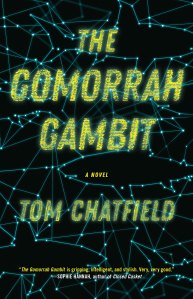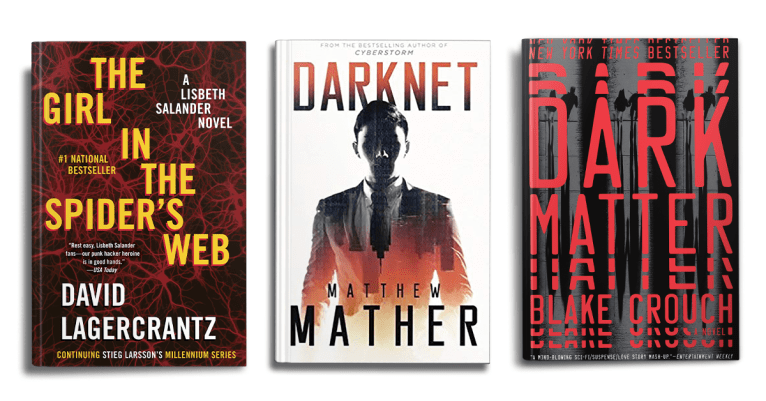Why Hacking is the Future of Crime Fiction
 From a criminal’s point of view, the perfect crime is one nobody even knows you committed. It’s so smart, subtle—or viciously effective—that the world blinks and looks the other way while you’re strolling out of the bank, whistling, your bag stuffed with jewels.
From a criminal’s point of view, the perfect crime is one nobody even knows you committed. It’s so smart, subtle—or viciously effective—that the world blinks and looks the other way while you’re strolling out of the bank, whistling, your bag stuffed with jewels.
When it comes to bank vaults, there aren’t that many perfect crimes. Online, however, hundreds are committed every day: computer systems paralyzed and held to ransom; inboxes hacked and identities stolen; credit card details auctioned off; fake goods and bogus services passed off as real; websites overloaded and shut down by hijacked “zombie” devices. And that’s before you dive into the delights of spamming, phishing and stalking—with the vast majority of perpetrators getting away with it. Committing crimes, online, is horribly easy, while catching people takes a great deal of effort.
That’s the world from the criminal perspective. From a thriller author’s point of view, the perfect crime is rather different. What I’m always looking for is perfect in another sense: an act notable for sheer verve and entertainment value, for its flouting of norms and expectations. And where the digital world truly delivers on this front is among the elite hackers competing to crack the world’s most secure systems—often in the service of the very organizations operating those systems.
At recent DefCon and Black Hat conferences—the world’s most important gatherings of information security experts—eye-opening demonstrations included a hacking team remotely taking control of a jeep and steering it into a ditch; vulnerabilities in implanted medical devices enabling hackers to give patients an electrical shock via their pacemaker or adjust the dosage administered by their insulin pumps; and the hijacking of a carwash’s robotic arm, turning it into a vehicle-mangling weapon.
I love these demonstrations both because they’re brilliantly smart and because they’re essential tools for making the systems that surround us more secure: legally sanctioned explorations of crimes that others might commit. White Hats, as those working on hacking’s ethical side are known, are perhaps the world’s most important defense against cybercrime—because they’re the ones with enough imagination and expertise to bring it to its knees.
I’ve spent much of the last decade writing books of non-fiction about digital culture and, along the way, I’ve saved up countless barely credible tales of technological infiltration that have found their way into my debut novel, The Gomorrah Gambit. My favorite? It might be the time hackers infiltrated a casino’s systems via the sensors in its internet-connected fish tank; or the soldiers who accidentally drew an online map of their secret base’s layout by uploading GPS data taken from their running routes. Or there’s the device that lets you predict when a one-armed-bandit is about to pay out its jackpot—but you’ll have to read the novel for details.
If there’s one thing I’ve found over the course of my research, it’s that reality is invariably stranger than fiction—because only fiction is obliged to make sense. Online, there’s one rule: whatever you can think of, someone is already making money out of something far worse. You’d better hope, in other words, that somewhere out there a hacker is on your side.
About the Book
Azi Bello is an amiable outsider with a genius for hacking. Having spent the better part of his life holed up in a shed in his backyard, Azi has become increasingly enmeshed in the dark side of the internet. With the divide between online and offline worlds vanishing, so too is the line between those transforming civilization through technology and those trying to bring it to its knees. Dark networks rule. Someone with the right connections can access to anything imaginable, and power is theirs for the taking-although even they can’t know what kind of bargain they’ve struck.
Tipped off by a secretive young woman named Munira, Azi sets out to unravel the mysterious online marketplace known as Gomorrah, sacrificing his carefully constructed privacy in the process. Munira’s life is spiraling out of control: her cousins recruited to work for a terrorist state that’s hunting them both, her destiny in Azi’s hands. Her desperation drags Azi into the field where, working together, the two uncover an unimaginable conspiracy.
As pressure mounts, Azi has no choice but to take on the ultimate infiltration. In an age when identities can be switched at will and nobody is who they seem, how far will he go to end the nightmare?
About Tom Chatfield
Dr. Tom Chatfield is a British writer, broadcaster and tech philosopher. Interested in using digital technology to improve our experiences, his past books, including Netymology, explore digital culture and have appeared in over two dozen countries and languages. He lives near London with his family.
By clicking 'Sign Up,' I acknowledge that I have read and agree to Hachette Book Group’s Privacy Policy and Terms of Use






